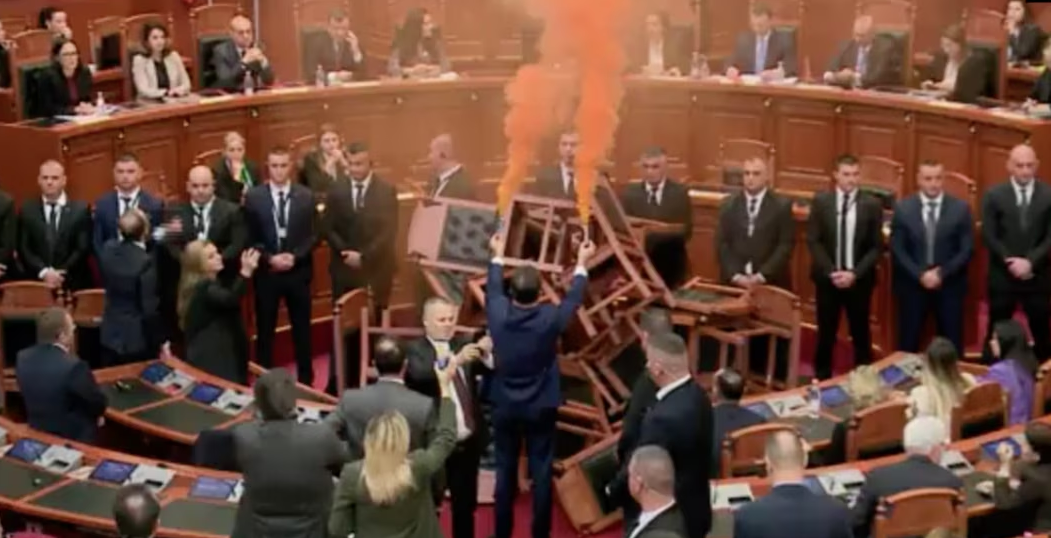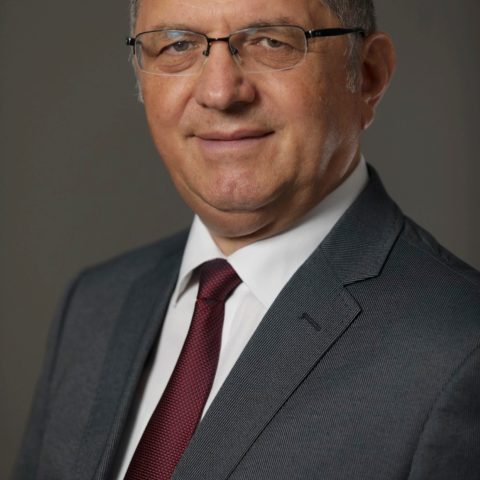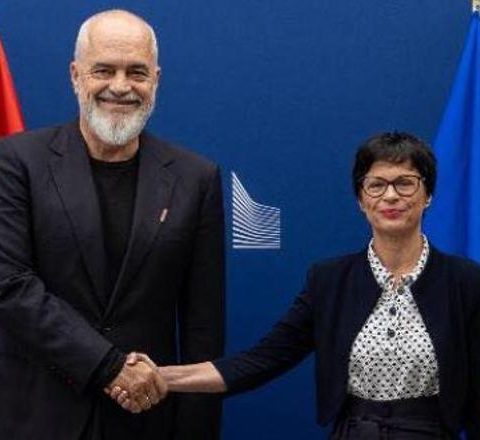TIRANA, Nov. 23, 2023 – Albania’s Parliament, controlled by the ruling Socialist Party, approved the 2024 state budget this week in less than two minutes and without any discussion amid chaotic scenes that saw opposition MPs lit up stadium flares and overthrow chairs in an attempt to disrupt the proceedings.
Albania’s parliament has seen several similar scenes this month, with opposition MPs protesting what they say is the denial by the majority of their constitutional rights to create investigative parliamentary commissions to hold the government accountable. The opposition says the creation of these inquiry commissions is routinely denied by the majority.
The ruling Socialist Party has been able to bypass the opposition protests by holding some committee meetings online, passing bills with no discussion in record time and using its numerical majority to shut down opposition requests for investigative parliamentary committees.
The trend has prompted concerns over the majority shutting the opposition out of the legislative process and disregarding the interests of a large part of the electorate.
“The essence of the matter lies in the fact that for a long time, in Albania, the aspirations of a large number of people, 600,000-700,000, who vote and express themselves openly against policies of [Prime Minister] Edi Rama are being trampled and trodden on,” Andi Bushati, an independent media analyst, writes in an opinion article.
He adds that the suppression of such a large part of the electorate has created a two-class system in Albania, in which opposition supporters are openly discriminated against at all levels.
Afrim Krasnqi, a political sciences academic and frequent media commentator, expresses dismay at the situation in parliament saying it is all “unimaginable” for a country like Albania that is a candidate to join the European Union.
“This is the institution that is supposed to be a temple of democracy. In just 1.34 minutes of session, flames and smoke and riots, the 2024 state budget was approved without debate,” he wrote on X, formerly known as Twitter, adding: “Of the 73 MPs in the parliamentary floor, 83 were in favor! Sad and revolting. Albania and its citizens deserve some respect.”
-International partners concerned-
After the chaotic scenes in parliament, US, EU, and UK diplomats in Tirana have raised concerns, emphasizing the importance of a functional parliament that exercises effective oversight and legislative roles.
The EU Delegation to Albania underscored the significance of constructive and inclusive political dialogue for the country’s EU accession process. The US and UK embassies echoed these sentiments, emphasizing the detrimental impact of repeated dysfunction in the parliament on the interests of the Albanian people.
Ilda Zhulali, an expert in international relations, interpreted the international community’s reactions as an awakening to the deteriorating democratic situation.
She stressed the need for adherence to the law, constitution, and constructive dialogue to resolve the crisis.
“The reactions of the internationals have the same message, as it is a continuation of the messages they have given through reports. We had the progress report a while ago and the progress report said the same thing. And these statements say that this situation is unacceptable and this is resolved in two ways. The first is to apply the law and the constitution respecting the rights it provides for the opposition and through constructive dialogue,” Zhulali says.
The renewed crisis raises questions about the future of democratic governance in Albania and the potential ramifications for its European Union aspirations, the experts agree.
-No compromise seen in the near future-
Former Prime Minister Sali Berisha, leader of the largest opposition group, decried the budget vote as unconstitutional, accusing the majority of stifling the opposition’s parliamentary rights for investigative commissions.
Berisha vowed that the opposition’s actions would persist in an effort to restore democracy in the country.
“This majority continues to violate the constitutional rights of the opposition for parliamentary investigative commissions. The opposition action will continue without stopping to restore democracy in the country,” Berisha said.
Bledi Çuçi, the leader of the parliamentary group of the ruling Socialist Party, attributed the disruption to internal conflicts within the main opposition Democratic Party, saying the opposition’s crisis was self-inflicted.
“This is a manifestation of the internal war in the ranks of the Democratic Party. We will not leave the country without a budget. We don’t have a crisis. The opposition has a crisis.”
The Socialist Party narrative has been that it won’t deal at all with the DP group led by Berisha, which has the majority of the opposition voter support, due to Berisha’s current domestic legal troubles and designation for corruption by the United States.
Berisha says the investigation that has him banned from leaving the country is entirely political and instigated by Rama as part of a concerted effort to destroy the opposition.
The SP and the Albanian state continue to recognize the DP group led by Lulzim Basha as official opposition, even though they have only a handful of MPs left in parliament and have shown dismal numbers in recent local elections.
But the division of the opposition, experts say, has further weakened its ability to keep an already authoritarian ruling majority in check after a series of electoral losses in a system that strongly favors the incumbents.










